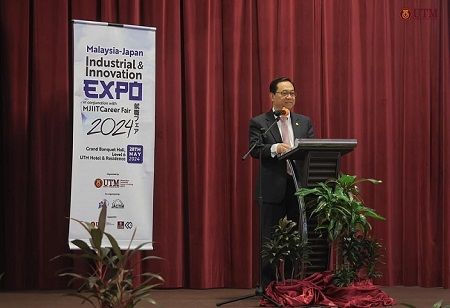The Malaysia-Japan Industrial and Innovation Expo (MJIIX), alongside the MJIIT Career Fair 2024, hosted a successful university-industry-government forum at Residensi UTM in Kuala Lumpur. The forum featured three distinguished panelists representing academia, industry, and government. Assoc. Prof. Ts. Dr. Mohd Ibrahim Shapiai, Director of the Centre of Artificial Intelligence and Robotics (CAIRO), moderated the event, posing two rounds of questions on the themes of (i) Utilizing Technology for Sustainable Development and (ii) Cooperative Models for Education and Technology.
Prof. Dr. Azlinda Azman, the Director General of Higher Education at the Department of Higher Education from the Ministry of Higher Education (MoHE), has mentioned some important strategies. She emphasized that higher education is now focused on flexible and tech-enabled learning under the Malaysia Madani initiative. The previous Malaysia Higher Education Framework blueprint for 2015-2025 included digital learning, and the next blueprint for 2026-2035 will further integrate technology into teaching and learning to advance education.
The ongoing development of the Higher Education Digitalization Policy and Action Plan for 2024-2030 demonstrates MoHE's robust endorsement of technological advancements. Furthermore, Prof. Dr. Azlinda Azman commended the recent introduction of AI Nexus and advocated for its widespread adoption across universities, emphasizing tailored applications in specific domains.
Meanwhile, Tn. Hj. Sharul A. Rashid, the PETRONAS Head of Technical Excellence and Custodian Engineer Instrument and Control, Group Technical Solutions, shared his thoughts on the challenges of preparing the next generation of talent for the industry. He highly recommended implementing a mentorship program for graduates, with mentors from multinational corporations (MNCs), to help prepare them for the industry. He believes IT-related subjects such as programming or IT business management should be supplementary courses for core engineering disciplines like electrical, mechanical, or civil engineering. Graduates should also develop their leadership skills by participating in societal activities and taking on organizational roles.
PETRONAS has launched the Collaboration with Higher Education Strategic Initiatives (CHESS) program to cultivate partnerships between academia and industry, foster talent and technology development, and promote innovation towards a sustainable future. As part of this initiative, a symposium involving 22 local universities has been convened to accelerate the advancement of talent and technology in sustainable energy innovation.
Prof. Dr. Kanao Fukuda, Deputy Dean (Liaison and Internationalisation) at the Malaysia-Japan International Institute of Technology (MJIIT), underscored the significance of fostering collaboration across diverse entities, highlighting that diversity brings unique strengths to the forefront. Using MJIIT as an example, he illustrated how its blend of Malaysian and Japanese influences makes it distinctive and appealing. Dr. Fukuda emphasized that for sustainable development to flourish, university students must focus on understanding the 'big why' to address uncertainties, while industries should concentrate on the 'how'. He also noted that MJIIT has produced over 1,000 graduates, many of whom are employed in Japan, and highlighted their pivotal role in future sustainable development efforts by bridging academia and industry.

